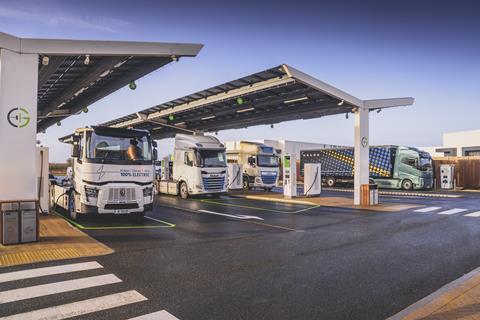
The consortium behind a government-backed project to encourage the decarbonisation of heavy goods vehicles has unveiled more details of its plans.
The Electric Freightway programme was launched in October by a group of businesses led by sustainable energy company Gridserve, with the aim of monitoring the performance of a fleet of up to 140 electrically-powered trucks – or eHGVs – and establishing a nationwide eHGV charging network with 200 chargepoints.
The seven-year initiative is supported by the Department of Transport and Innovate UK as part of the Zero Emission HGV and Infrastructure Demonstrator programme. The government has set a deadline of 2040 to remove diesel powered HGVs from the road.
With some of the transport companies taking part in the project – who include Royal Mail, AF Blakemore, and Kuehne + Nagel – receiving their first eHGVs this spring, an update this week from consortium partner Hitachi ZeroCarbon outlines how it will begin to survey those companies’ experiences with the trucks.
The report also reveals that Gridserve is expecting sign offs from a series of landowners, property owners, and local authorities to start installing its first eHGV charging depot, the location of which it has not disclosed.
HGVs account for around a fifth of the UK’s transport greenhouse gas emissions and decarbonisation of this sector is seen as essential for the UK to meet its 2050 net zero targets. However, eHGVs – as opposed to lighter electrically-powered commercial vehicles – are a relatively new phenomenon. There are also very few places where such large trucks can be charged.
Hitachi ZeroCarbon’s role in Electric Freightway is to collect and analyse data from the hauliers and vehicle manufacturers taking part. The latter include DAF, Renault, and Volvo. From this Hitachi ZeroCarbon will build modelling to support investment business cases for eHGV deployments.
Gridserve plans to establish the chargepoints, capable of delivering 350kW of power, at motorway service stations, truck stops, and at least 10 commercial depots.
James Comer, programme director, Hitachi ZeroCarbon, says the Electric Freightway project will “tangibly test what a zero-carbon future could look like”.
Sam Clarke, chief vehicle officer at Gridserve, describes the decarbonisation of the UK truck fleet as “one of the greatest disruptors haulage and logistics have ever seen”.
He adds: “In Electric Freightway, we’ll push electric HGVs to their limits to establish just what is possible, while highlighting where there is the need for process, technological or policy innovation to enable the transition to electric.”
The next report, due this summer, will provide insight into the performance of some of the eHGVs on the programme, as well as “lessons learnt” from the first eHGV infrastructure installation.
































